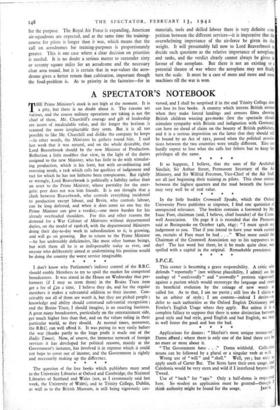A SPECTATOR'S NOTEBOOK
THE Prime Minister's stock is not high at the moment. It is a pity, but there is no doubt about it. The reasons are various, and the course military operations are taking is not the chief of them. Mr. Churchill's courage and gift of leadership are assets of -incalculable value, and the longer the horizon ,is scanned the more irreplaceable they seem. But it is all too possible to like Mr. Churchill and dislike the company he keeps —in other words, the Ministers he gathers round him. I said last week that it was natural, and on the whole desirable, that Lord Beaverbrook should be the new Minister of Production. Reflection a little modifies that view, in the light of the duties assigned to the new Minister, who has little to do with stimulat- ing production, which is his forte, but with co-ordinating and assessing needs, a task which calls for qualities of judgement and tact for which he has not hitherto been conspicuous. But rightly or wrongly, Lord Beaverbrook is politically a liability rather than an asset to the Prime Minister, whose partiality for the ener- getic peer does not win him friends. It is not thought that a clash between Beaverbrook, who controls everything incidental to production except labour, and Bevin, who controls labour, can be long deferred, and when it does come no one but the Prime Minister can give a verdict,—one more burden for his already overloaded shoulders. For this and other reasons the demand for a War Cabinet of Ministers without departmental duties, on the model of 1916-18, with the departmental Ministers doing their day-to-day work in subordination to it, is growing, and will go on growing. But to return to the Prime Minister —he has undeniably deficiencies, like most other human beings, but with them all he is as indispensable today as ever, and anyone who deliberately aimed at undermining his position would be doing the country the worst service imaginable.


























 Previous page
Previous page